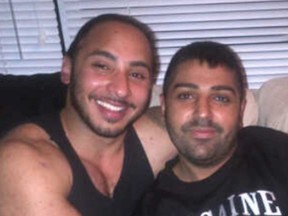The Correctional Service Canada team overseeing Jujhar Khun Khun’s release said he was “not a suitable candidate for residency” in a halfway house

A high-profile United Nations gangster, who was part of the 2011 conspiracy to kill Red Scorpion Jonathan Bacon in Kelowna, was released from prison over the weekend.
But while Jujhar Khun Khun has continued his gang affiliation, he will not have to stay in a halfway house, known as a community residential facility, according to a new decision by the Parole Board of Canada.
The 37-year-old automatically qualifies for statutory release having served two-thirds of a 10-year sentence imposed after he pleaded guilty in May 2018 to conspiracy to kill Bacon. Almost all Canadian inmates get statutory release, although some are placed on special conditions.
In November, the parole board ordered Khun Khun to live in a halfway house because of his continued “propensity for violence.”
However in the latest ruling, released Friday, board member Patrick Storey removed the residency condition, while maintaining a series of other strict terms for Khun Khun’s post-prison life.
Storey said the residency requirement ordered by another board member Nov. 29 was reviewed after Khun Khun’s lawyer made written submissions against it.
“To impose a residency condition, the board must be satisfied that, in the absence of such a condition, you will present an undue risk to society by committing, before the expiration of your sentence,” Storey noted.
“The board removes the residency condition imposed earlier on your statutory release. The board is not satisfied in the absence of this condition, you will pose an undue risk.”
Storey said that the Correctional Service Canada team overseeing Khun Khun’s release believed he was “not a suitable candidate for residency” in a halfway house.
The team recommended that Khun Khun “secure your own private, independent accommodation, which could include a hotel, a detached home or an apartment building. Your accommodations will have to be approved by your parole officer.”
The team had concerns about Khun Khun living in a halfway house because of the high-profile nature of the Bacon murder, his continuing gang membership and “concerns for the safety of (Correctional Service Canada) staff, contractors and others.”
Storey referenced the letter from Khun Khun’s lawyer, sent to the board on Dec. 13.
“He writes that the board did not consider the benefits of anonymity if you were allowed to live in private accommodations. This, he says, would be safer for his client and safer for the general public. He argues further that you have much support in the community. He argues that police will be involved in your supervision and that this will also serve public safety.”
Storey said the other conditions imposed on Khun Khun should keep the public safe.
“There are alternative supervision strategies adequate to the task of managing your risk to reoffend generally, and with violence, and protecting the community,” he said.
“Electronic monitoring and police checks, as well as regular police, supported supervision, meetings, and collateral contacts will serve to hold you sufficiently accountable for your activities, whereabouts and associations.”
“Other strategies like limiting your access to telecommunications devices, monitoring your use of these devices, the geographic restriction and monitoring your financial dealings, add additional accountability strategies that will help in the management of your risk.”

Details of where Khun Khun will live were blacked out in the six-page decision.
But he was earlier ordered to stay away from communities where warring gangs congregate.
“You shall be under a geographical restriction, which mitigates your risk by preventing you from entering the areas of British Columbia where there is still a large presence of security threat groups,” the Nov. 29 ruling said.